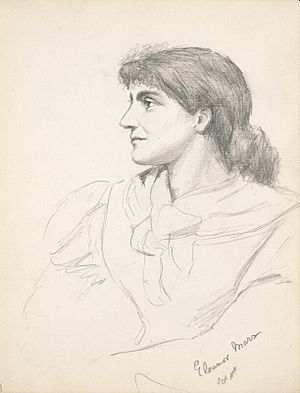Eleanor Marx facts for kids
Quick facts for kids
Eleanor Marx
|
|
|---|---|
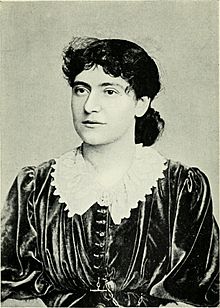
Eleanor "Tussy" Marx
|
|
| Born |
Jenny Julia Eleanor Marx
16 January 1855 London, England
|
| Died | 31 March 1898 (aged 43) London, England
|
| Occupation | Socialist activist, translator |
| Partner(s) | Edward Aveling |
| Parents |
|
| Relatives | Laura Marx (sister) Jenny Longuet (sister) Henry Juta (cousin) Louise Juta (aunt) Heinrich Marx (grandfather) Henriette Pressburg (grandmother) Anton Philips (second cousin) Gerard Philips (second cousin) |
Eleanor Marx (born January 16, 1855 – died March 31, 1898) was an important English activist. She was the youngest daughter of the famous thinker Karl Marx. Her family called her Tussy. Eleanor worked to make society fairer for everyone, and she also translated books. She spent her life fighting for workers' rights and equality.
Contents
Who Was Eleanor Marx?
Eleanor's Early Life and Family
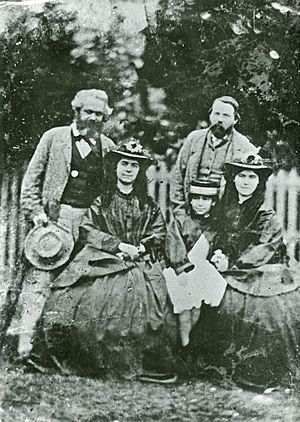
Eleanor Marx was born in London, England, on January 16, 1855. She was the sixth child of Karl Marx and his wife, Jenny von Westphalen. Her family gave her the nickname "Tussy" when she was very young. Even as a child, Eleanor was interested in politics and wrote letters to important political figures. When she was twelve, she was very upset by the unfair treatment of some Irish activists. This made her care deeply about people who were treated unfairly throughout her life.
Her father, Karl Marx, loved telling stories. This sparked Eleanor's interest in books and plays. By the age of three, she could already recite parts of William Shakespeare's plays! As a teenager, she started a "Dogberry Club" with her family and friends. They would read Shakespeare aloud while her father listened.
While Karl Marx was writing his big book, Das Kapital, Eleanor often played in his study. He even made up a special story for her about a character named Hans Röckle. Eleanor said this was one of her favorite childhood stories. This story helped her understand her father's ideas about how money and power worked in society. When she grew up, Eleanor helped translate and edit parts of Das Kapital. She also turned her father's talks about money and work into books. One writer said that Eleanor grew up with Das Kapital, learning a lot about British history, money, and society.
When Eleanor was sixteen, she became her father's secretary. She traveled with him to meetings about socialism around the world. Socialism is a way of organizing society where everyone shares resources and works together for the good of all. A year later, she met Prosper-Olivier Lissagaray, a journalist. Eleanor helped him write History of the Commune of 1871, and she later translated it into English.
Caring for Her Family
In the early 1880s, Eleanor took care of her parents as they got older. Her mother passed away in December 1881. Then, from August 1882, she looked after her young nephew, Jean Longuet, for several months. This helped her older sister, Jenny Longuet, who was very ill and died in January 1883. Her father, Karl Marx, died two months later in March 1883.
After her father's death, Eleanor worked with Edward Aveling and Friedrich Engels to prepare the first English version of Das Kapital Volume I. It was published in 1887. When Engels died in 1895, Eleanor and Aveling carefully organized and stored all of her father's many papers.
Eleanor was proud of her Jewish heritage. She once said, "I am a Jewess!" This was special because her grandparents had left Judaism. She became interested in her Jewish background after meeting Jewish workers in London who were fighting for fairness. She also learned Yiddish, a Jewish language, and sometimes gave talks in it.
Eleanor's Important Work
Joining the Socialist Movement
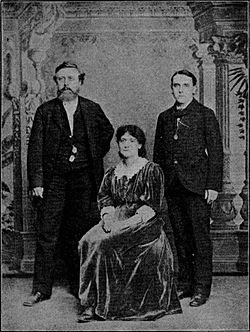
In 1884, Eleanor joined a group called the Social Democratic Federation (SDF). She was chosen to be part of its leadership. While working with the SDF, she met Edward Aveling. They worked together for the rest of her life.
Forming the Socialist League
In 1885, Eleanor Marx and some others left the SDF. They started a new group called the Socialist League. This happened because they disagreed with how the SDF was run and felt it wasn't focused enough on international cooperation. Eleanor believed that workers around the world should unite.
Other important leaders in the Socialist League included William Morris, Ernest Belfort Bax, and Tom Mann. Eleanor wrote a regular column for the Socialist League's newspaper, Commonweal. Her column was called "Record of the Revolutionary International Movement."
In 1884, Eleanor met Clementina Black, who was a painter and a leader in workers' unions. Eleanor became involved with the Women's Trade Union League. She supported many strikes, including a famous match factory strike in 1888 and the London Dock Strike of 1889. She helped organize the Gasworkers' Union and wrote many books and articles.
In 1885, she helped plan an important international meeting for socialists in Paris. The next year, she traveled across the United States with Aveling and a German socialist named Wilhelm Liebknecht. They raised money for a political party in Germany.
By the late 1880s, the Socialist League had different ideas about how to achieve their goals. Eleanor and Aveling believed in taking part in elections and political campaigns. However, some members thought that elections would make them compromise their beliefs, and others didn't believe in elections at all. Because of these disagreements, Eleanor and Aveling left the Socialist League and formed a new group called the Bloomsbury Socialist Society.
Bloody Sunday Protest
Eleanor helped organize a large protest in London on November 13, 1887. This day became known as Bloody Sunday because the police used violence to stop the protest. Eleanor was very active in the protests that followed. She wrote a report about how badly women activists were treated by the police, saying that the police specifically targeted women.
In 1893, Keir Hardie started the Independent Labour Party (ILP). Eleanor attended their first meeting. She and Aveling wanted the ILP to follow more of Karl Marx's ideas, but the party was more influenced by Christian socialist beliefs. In 1897, Eleanor and Aveling rejoined the Social Democratic Federation.
Eleanor's Translation Work
Eleanor started working as a paid translator in the late 1870s. She spent many days at the British Museum, gathering information and working on her translations. In the late 1880s, Eleanor completed the first English translation of Madame Bovary, a famous French novel. She also translated Reuben Sachs by Amy Levy into German. Eleanor was involved in translating or editing 14 different books and works.
Involvement in Theatre
In the 1880s, Eleanor Marx became very interested in theatre and started acting. She believed that plays could help spread ideas about socialism. In 1886, she performed in a special reading of Henrik Ibsen's play A Doll's House in London. She played the main character, Nora Helmer, with Aveling as Torvald and George Bernard Shaw as Krogstad.
She also translated many plays and books. She even learned Norwegian so she could translate Ibsen's plays into English. In 1888, she was the first to translate An Enemy of Society. Two years later, the play was updated and renamed An Enemy of the People. Eleanor also translated Ibsen's The Lady from the Sea in 1890.
Eleanor's Later Life and Legacy
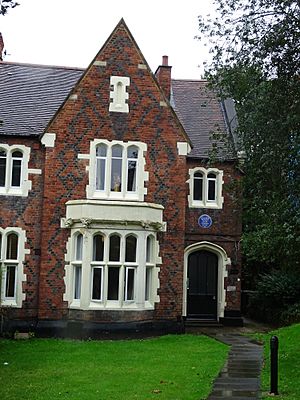
Eleanor Marx died on March 31, 1898, when she was 43 years old.
Her funeral was held on April 5, 1898, and many people came to say goodbye. After the service, Eleanor Marx's body was taken to Woking and cremated. Her ashes were kept safe by different socialist groups for many years. Finally, in 1956, her ashes were buried next to her father, Karl Marx, and other family members in the tomb of Karl Marx at Highgate Cemetery in London.
On September 9, 2008, a special blue plaque was placed on the house where Eleanor lived for her last few years. This house is at 7 Jews Walk in Sydenham, south-east London. These plaques are put on buildings to remember famous people who lived there.
Books by Eleanor Marx
Writings
- The Factory Hell. With Edward Aveling. London: Socialist League Office, 1885.
- The Woman Question. With Edward Aveling. London: Swan Sonnenschein & Co., 1886.
- Shelley's Socialism: Two Lectures. With Edward Aveling. London: privately printed, 1888.
- Israel Zangwill / Eleanor Marx: "A doll's house" repaired. London (Reprinted from: "Time", March 1891).
- The Working Class Movement in America. With Edward Aveling. London: Swan Sonnenschein & Co., 1891.
- The Working Class Movement in England: A Brief Historical Sketch Originally Written for the "Voles lexicon" Edited by Emmanuel Wurm. London: Twentieth Century Press, 1896.
Translations
- Edward Bernstein, Ferdinand Lassalle as a Social Reformer. London: Swan Sonnenschein & Co. 1893.
- George Plechanoff, Anarchism and Socialism. Twentieth Century Press, London 1895
- Gustave Flaubert, Madame Bovary: Provincial Manners. Vizetelly & Co., London 1886
- Gustave Flaubert, Salammbô London 1862
- Henrik Ibsen, An Enemy of the People. Walter Scott Publishing Co., London 1888
- Henrik Ibsen, The Lady from the Sea. Fisher T. Unwin, London 1890
- Henrik Ibsen, The Pillars of Society and Other Plays. London: W. Scott, 1888.
- Henrik Ibsen, The Wild Duck: A Drama in Five Acts. W.H. Baker, Boston 1890
- Prosper-Olivier Lissagaray, History of the Commune of 1871. Reeves / Turner, London 1886
Eleanor in Film
Eleanor Marx's life was shown in the movie Miss Marx (2020), directed by Susanna Nicchiarelli.
See also
 In Spanish: Eleonor Marx para niños
In Spanish: Eleonor Marx para niños
 | Roy Wilkins |
 | John Lewis |
 | Linda Carol Brown |


